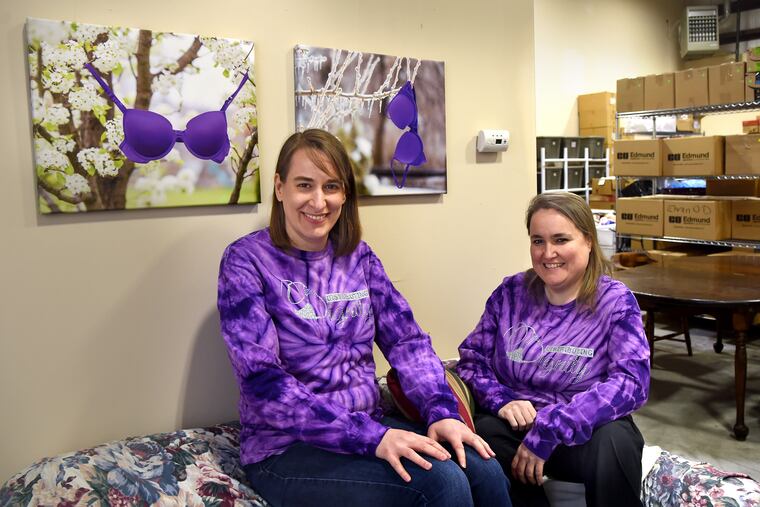This couple provides free bras and feminine-hygiene products to needy women
Joanie Balderstone and Rebecca McIntire are the founders of Distributing Dignity.

Social worker Jeey Moncayo will never forget the day in 2014 when a new client showed up at the domestic violence survivor shelter in Camden where she was working. The woman’s only clothes were on her back; her abusive partner had bleached everything else she owned.
Moncayo counseled the woman and provided guidance on accessing additional help. Then, before the woman left, Moncayo asked her a question.
“What size bra do you wear?”
Taken aback, the woman fell silent. So Moncayo led her to a storage room filled with new bras in a range of colors, fabrics, and sizes. “Take whichever ones you’d like,” Moncayo told her.
The bras — along with an inventory of tampons, sanitary pads, and panty liners — came courtesy of Distributing Dignity, a South Jersey nonprofit started by Joanie Balderstone and her wife, Rebecca McIntire. As seemingly mundane as bras and drugstore items may seem, for Moncayo’s client they sent a message of compassion and hope.
On her way out of the clinic, the woman thanked Moncayo and, looking at the bra, said, “Now I feel like a real woman.”
It’s that sense of self-worth that Balderstone and McIntire want to provide to any woman who needs it.
The idea came to them in 2010. They had just donated work wear to a homeless shelter in Camden, for women who were going on job interviews or back into the workforce.
While at the center, one of the clothing recipients approached Balderstone.
“She said, ‘Thank you for the suit — but I don’t have a decent bra to wear underneath it,’ ” Balderstone recalls. Balderstone asked what else she needed. The answer: pads, tampons, and liners.
“As a two-woman household, Rebecca and I couldn’t wrap our heads around the idea of not having those products,” says Balderstone.
So the couple hosted a “mardi bra” party to which guests brought new bras for the shelter. “People would ask if we’d accept gently-used bras, but I really wanted to give something new,” Balderstone says. She wanted recipients to feel worthy of something just for them.
The party produced 80 bras and thousands of hygiene products. The next year, they held another mardi bra, expanding their reach to agencies that help young women who are aging out of foster care and families impacted by HIV and AIDS. In 2014, when they registered as an official 501(c)(3) nonprofit, their party yielded enough goods for 12 organizations.
Now, Distributing Dignity has 70 partners across 52 cities. Between 2015 and 2018, the group distributed more than a half million feminine-hygiene products and just about 10,000 bras. Depending on where the organizations are located, Balderstone and McIntire will either ship inventory from New Jersey, or arrange a connection between a local organization that’s rounding up items and an agency in need. (In Philly, Distributing Dignity partners with Sunday Breakfast Rescue Mission, Depaul, The Sunday Love Project, and Valley Youth House.)
The organization is volunteer-run: McIntire works full-time in project management; Balderstone works part-time running a friend’s law practice. But the women now have warehouse space in Cherry Hill for inventory, a van that helps them personally make deliveries in crises (like last year’s hurricane in North Carolina), and the support of women and men worldwide.
Their research has revealed that not only are new bras and feminine-hygiene products often in short supply at women’s and family agencies, but the lack of access to both has a measurable effect.
Girls in Camden, Balderstone says, for whom education is a ticket to a better life, miss school because they don’t have proper products.
“To deprive these young women because of that is really unforgivable,” Balderstone says.
In Camden, where the infant mortality rate is highest in the state, new mothers sometimes miss postnatal appointments because they don’t have proper nursing bras. Social worker Moncayo says the women have told her that, against doctor’s warnings, they often dangerously sleep with their newborns because they’re leaking so much milk that it’s just easier to have the baby with them in bed for nursing.
“The donations from Distributing Dignity are like a blessing,” says social worker Moncayo, who most recently worked at Southern New Jersey Perinatal Cooperative with African American and Hispanic women to improve health outcomes for them and their babies. “Many women would rather buy milk and eggs for their children than use their money to buy hygiene products.
“And a beautiful bra humanizes someone who is going through a time of need. The effort, the love, that Distributing Dignity puts into thinking of women in a positive way is nothing short of empowering. I cannot imagine doing my work without them.”
Balderstone and McIntire only want to do more. “If the need is in all 50 states, we want to be in all 50 states,” Balderstone says. Because Distributing Dignity is about more than providing needed products.
“It’s about sending a message to each woman that there are people who want the best for them. When we to validate one another, [it sends] the message that we’re worth it. I don’t think it gets more powerful than that.”
This story originally appeared in The Philadelphia Citizen.